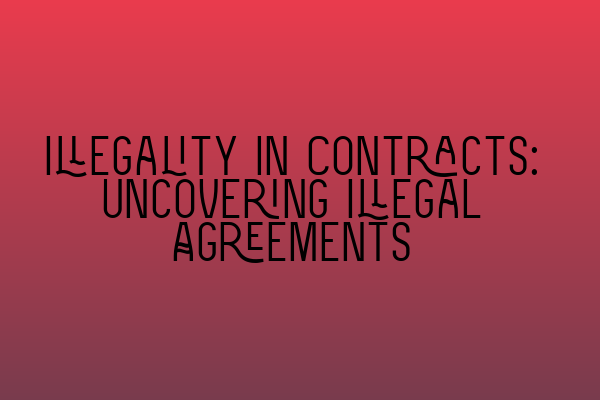Illegality in Contracts: Uncovering Illegal Agreements
Welcome to SQE Contract Law! As experts in contract law, we understand the importance of ensuring that every aspect of your contracts is legally compliant and ethically sound. In this blog post, we will dive deep into the topic of illegality in contracts, exploring the various implications and consequences of engaging in illegal agreements.
Understanding Illegal Agreements
Illegal agreements refer to contracts that are against the law or public policy. These agreements are considered unenforceable by the courts, meaning that if a party breaches the contract, the injured party cannot seek legal remedies for any losses suffered. It is crucial to identify and avoid entering into such agreements to protect your rights and interests.
There are different types of illegal agreements, including:
- Agreements that violate statutes
- Agreements that are contrary to public policy
- Agreements that involve illegal purposes
- Agreements that promote fraud or deception
The Consequences of Engaging in Illegal Agreements
Engaging in illegal agreements can have severe repercussions. Let’s explore some of the consequences that may arise:
1. Unenforceability of the Contract
When a contract is deemed illegal, it becomes unenforceable. This means that neither party can rely on the contract to seek damages or enforce performance. Courts will not uphold agreements that are against the law or public policy.
2. Criminal Liability
In some cases, participating in illegal agreements may lead to criminal liability. Parties involved in illegal activities can face fines, penalties, and even imprisonment, depending on the nature and severity of the offense.
3. Loss of Reputation and Trust
Engaging in illegal activities can significantly damage your reputation and undermine trust with clients, partners, and other stakeholders. The negative consequences can extend beyond the legal realm, impacting your professional relationships and future business opportunities.
4. Voiding of Related Contracts
In certain circumstances, the illegality of one contract can result in the voiding of related contracts. For example, if a contract contains an illegal term, the entire agreement may be considered invalid, rendering any related contracts or transactions unenforceable.
Preventing Illegal Agreements: Best Practices
To safeguard yourself, your business, and your contracts from the pitfalls of illegality, it is essential to adopt certain best practices:
1. Seek Legal Advice
Consulting with a qualified solicitor is crucial when drafting or reviewing contracts. A legal expert can help you identify any potential illegalities and ensure that your agreements align with applicable laws and regulations.
2. Conduct Due Diligence
Before entering into any agreements, conduct thorough research to ensure that the proposed activities or terms are legal and comply with public policy. It is better to be cautious and informed than to face legal consequences later on.
3. Include Severability Clauses
Severability clauses can be inserted into contracts to protect the remaining valid parts of an agreement in case a portion is found to be illegal. This clause allows the court to strike out the illegal provision while preserving the rest of the contract.
4. Regularly Review and Update Contracts
As laws and regulations change, it is essential to review and update your contracts on a regular basis. Staying informed about legal developments and ensuring the legality of your agreements is a proactive approach to risk management.
By following these best practices, you can minimize the risks associated with illegal agreements and ensure that your contracts are valid and enforceable.
Conclusion
Illegality in contracts is a serious matter with significant legal and reputational consequences. By understanding the different types of illegal agreements and adopting best practices to prevent them, you can protect yourself and your business from the potential pitfalls. Remember, seeking legal advice and staying informed are key steps towards ensuring the legality and enforceability of your contracts.
If you found this article informative, you may also be interested in reading our related articles:
- Exploring the Impact of Frustration on Contractual Obligations: Legal Insights
- Interpreting Contractual Clauses: Unlocking the Hidden Meanings
- Legal Aspects of Business Contracts: Key Considerations for Entrepreneurs
- Agreements in Contract Law: Understanding Its Various Types
- Essentials of Consideration: Understanding the Basis of Contractual Exchange
